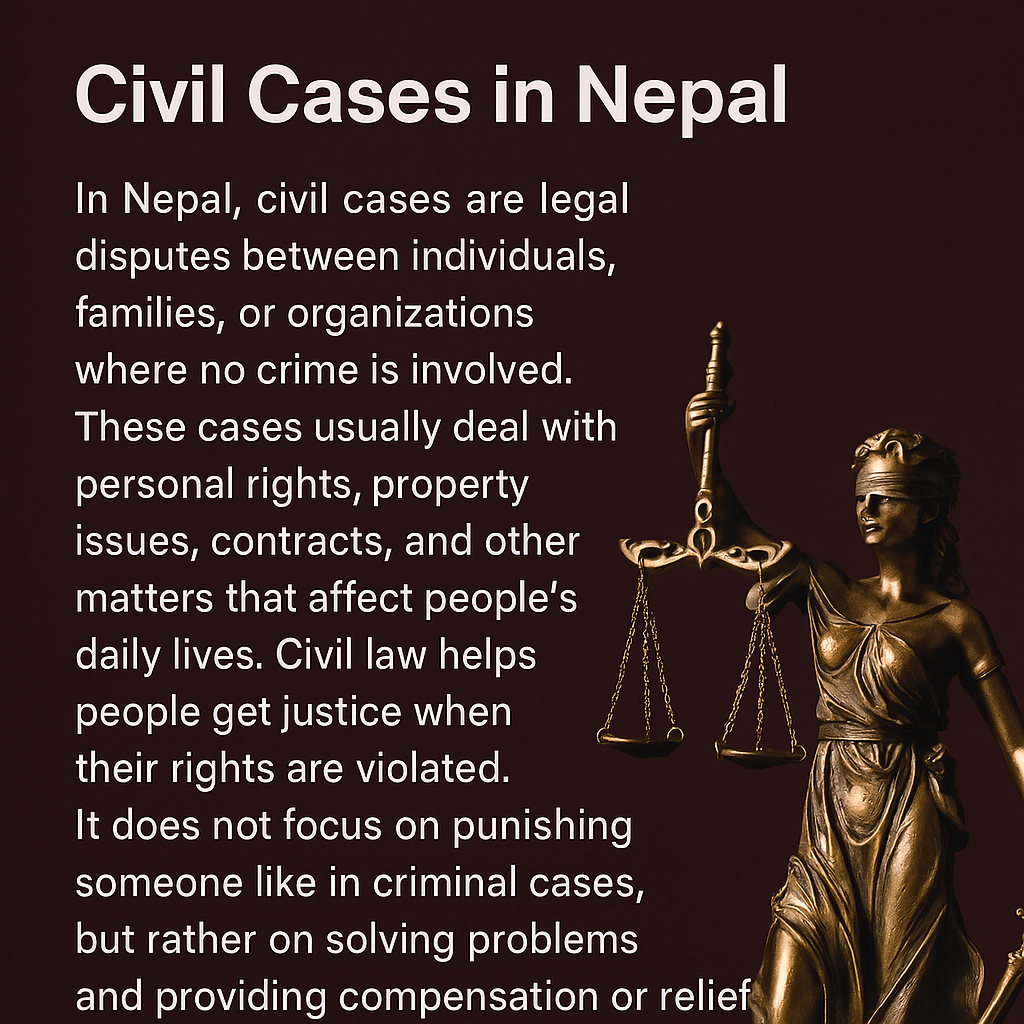
In Nepal, civil cases are legal disputes between individuals, families, or organizations that do not involve criminal offenses. These cases are guided mainly by the Muluki Civil Code, 2074 (2017) and the Civil Procedure Code, 2074 (2017). The civil justice system is designed to protect people’s legal rights and to provide remedies such as compensation, property division, or enforcement of agreements. The goal is to resolve disputes in a lawful and peaceful way.
According to Section 2 of the Civil Procedure Code, 2074, a civil case includes any dispute concerning personal, property, contractual, or legal rights. As per Article 148 of the Constitution of Nepal, and Section 6 of the Administration of Justice Act, 2073, civil cases are generally filed in District Courts. The court’s jurisdiction is based on the type and location of the dispute.
There are several types of civil cases in Nepal, some must arise disputes are:
- Property-Related Cases:
These include disputes about ownership, possession, and division of land or other assets. Under Part 5 of the Muluki Civil Code, especially Chapter on Partition (Section 217–248), individuals can file cases regarding ancestral property, equal share, and mismanagement of property. Inheritance and property rights are also protected under Part 4 of the Code.
2. Family-Related Cases:
Matters such as divorce (Sections 93–104), alimony, child custody, and marriage-related disputes fall under this category. These are handled under Part 3 (Family Law) of the Muluki Civil Code. The law encourages mutual consent but provides court intervention when agreement is not possible.
3. Contractual Disputes:
If a party fails to fulfill the terms of a valid agreement, the affected person can seek remedy through the court. These disputes are regulated by Part 8 (Section 531–589) of the Muluki Civil Code, which provides detailed provisions on contract formation, validity, breach, and remedies.
4. Tort and Compensation Claims:
These arise when someone suffers harm or loss due to another person’s wrongful act or negligence. As per Section 588 of the Muluki Civil Code, the injured party may claim compensation for physical, emotional, or material loss. Common tort cases include property damage, personal injury, and defamation.
5. Consumer Protection Cases:
Consumers who face issues like faulty goods or unfair services can file complaints under the Consumer Protection Act, 2075 (2018). Though these cases may be resolved by the Department of Commerce or local consumer forums, they may also proceed to civil courts if required.
The Civil Procedure Code, 2074, provides detailed procedures on how to file a case, present evidence, call witnesses, and appeal decisions. Sections 3 to 42 of this code explain the step-by-step process, including registration of complaint, service of notice, mediation, trial, and execution of judgment.
In conclusion, civil cases in Nepal cover a wide range of disputes and are governed by the Muluki Civil Code and Civil Procedure Code. These laws provide a fair platform for individuals to protect their rights and resolve conflicts peacefully. Understanding these legal provisions helps citizens use the justice system effectively and uphold the rule of law.
